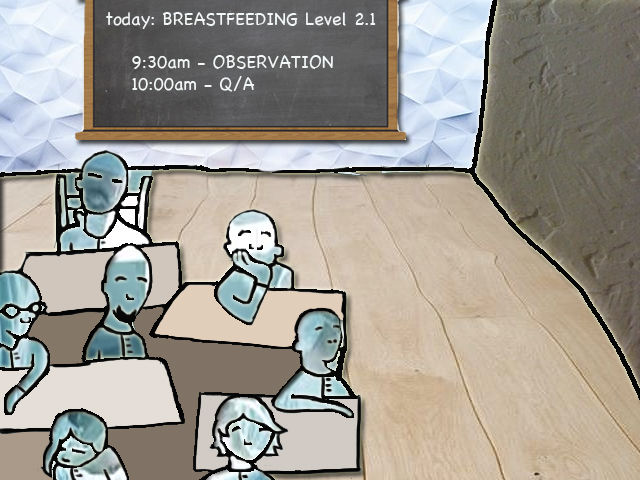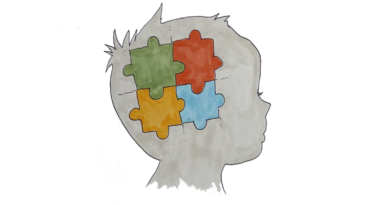Back To School To Learn About Breastfeeding

Astonishingly, doctors (paediatricians, gynaecologists, obstetricians, etc.) receive very little education about breastfeeding. In fact, for many years there was no teaching about breastfeeding in medical school at all! As one doctor said, “We have perhaps an hour and a half and we forget most of it.” They learn that breastmilk is best for baby. They are introduced to evidence that prolonged breastfeeding reduces the possibility of obesity, Sudden Infant Death Syndrome (SIDS), and allergies; but problems at the anatomical level and the actual act of breastfeeding are not covered, even tangentially.
Another difficulty is that doctors today don’t know where to place breastfeeding problems. Some doctors find that, since breasts are attached to women, breastfeeding problems should be the province of obstetricians (OBs). Obstetricians, on the other hand, note that infants breastfeed, so shouldn’t the paediatrician handle these kinds of difficulties?
Lactation is probably the only bodily function for which modern medicine has almost no training or protocols. When women have trouble breastfeeding, they are either told by well-meaning lactation consultants to try harder, or told by doctors worried about poor weight gain in the baby to give up. Too often, doctors tell women that their baby will be fine if they aren’t breastfed. An OB who treats breastfeeding problems in North Carolina commented, “Can you imagine if we did that [told them to give up and that they would be fine] to men with erectile dysfunction (ED)? ED is within the purview of many doctors’ services, and insurance usually covers Viagra, but what about lactation dysfunction or lactation failure? Many mothers turn to the Internet, where information is not always scientifically – or even correctly – based.”
They say that breastfeeding is a normal mammalian function and everyone can do it, but is this true?
In many countries breastfeeding rates, particularly amongst two- to three-month-old babies, are decreasing. How is the medical community failing breastfeeding mothers? It isn’t only the formula samples given out in hospitals, but also the lack of trained professional help for breastfeeding mums. This leaves breastfeeding problems in the hands either of the rare family physician who herself has breastfed (or whose wife has) or of a lactation consultant who can assist with technical issues. But a lactation consultant cannot write prescriptions, check hormone levels, or carry out other medical tests to find out what might be causing breastfeeding problems.
No one doubts that breast is best, but the truth is that many women quit too soon because of insurmountable breastfeeding problems. In spite of the WHO/UNICEF Baby-Friendly Hospital Initiative launched in 1990, not all healthcare staff are able to deal with day-to-day breastfeeding problems or to correct incorrect positioning and latch-on.
Breastfeeding and lactation need to be given a firm place in medical school curricula. Or, better yet, we could go even further: discuss breastfeeding in schools. UNICEF has designed teaching kits for different school levels, which introduce kids at an early age to the importance of breastfeeding.
In the United Arab Emirates, they are taking steps to promote education about breastfeeding. The Sharjah Education Council and the Sharjah Baby-Friendly Emirate Campaign have drawn up plans for 2013-2015 to make breastfeeding a part of the education curriculum at the primary, secondary and tertiary levels. This means that students will grow up with a greater awareness and stronger understanding of the medical, emotional, social and economic benefits of breastfeeding.
Dr. Hessa Khalfan al Ghazal, director of the campaign, said:
Some countries only emphasise the importance of breastfeeding to women who are already pregnant or after childbirth. However, by that stage it might be too late, because by then some women have already decided to use formula. Consequently, the earlier we teach students about the benefits of breastfeeding, the higher the chances are that when they grow up they will support baby-friendly practices as parents, nursery owners, hospital owners, etc. We feel we are planting the seed of awareness early in the educational process, to be of benefit at the time when the students of today graduate and become the employers, health professionals, and policymakers of tomorrow.
The Academy of Breastfeeding Medicine (ABM) is a worldwide organisation of physicians dedicated to the promotion, protection and support of breastfeeding and human lactation. Their mission is to unite members of various medical specialities with this common purpose. Their 2011 statement reads:
The science of breastfeeding and human lactation requires that physicians from many different specialities have a collaborative forum to promote progress in physician education. To optimize breastfeeding practices globally, physicians must incorporate the attitudes and skills needed to practice evidence-based breastfeeding medicine. The study of breastfeeding and human lactation is not currently recognized as a medical subspeciality, so that the maintenance of knowledge in this field has been vital. The lack of sufficient education and preparation for breastfeeding support and guidance by physicians has been well documented in the medical literature.
La Leche League grew out of mothers’ need to be supported in the wish to breastfeed, to fill the educational gap by providing information about breastfeeding. The Womanly Art of Breastfeeding, first published in 1958 and now into its eighth edition, covers all aspects of breastfeeding and the many problems mothers can experience. The founding mothers, back in 1958, were all breastfeeding mums living in a non-breastfeeding culture. Over the years, the League has grown, and today there are LLL leaders around the whole world, giving support to breastfeeding mums, pregnant women, and their families at monthly meetings, over the telephone, and per mail and e-mail. We welcome anyone interested in breastfeeding to attend our monthly meetings; for details about meetings in Switzerland, please consult our webpage.
By Joanna Koch
Joanna Koch is a long-time LLL leader and a team member of Mothering Matters since its inception.
Illustration by Susana Gutierrez
Susana is a freelance illustrator and the mother of two little girls. She also coordinates the Little Ladybirds English Playgroup near Triemli. She can be reached at s.escapa@gmail.com.



